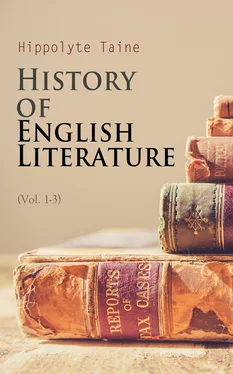[398]Ben Jonson, "Every Man in his Humour."
[399]"The Chronicle" of John Hardyng (1436), ed. H. Ellis, 1812, Preface.
[400]Act IV. sc. 2 and 4. See also the character of Calypso in Massinger; Putana in Ford; Protalyce in Beaumont and Fletcher.
[401]Middleton, "Dutch Courtezan."
[402]Commission given by Henry VIII to the Earl of Hertford, 1544: "You are there to put all to fire and sword; to burn Edinburgh town, and to raze and deface it, when you have sacked it, and gotten what you can out of it.... Do what you can out of hand, and without long tarrying, to beat down and overthrow the castle, sack Holyrood-House, and as many towns and villages about Edinburgh as ye conveniently can; sack Leith, and burn and subvert it, and all the rest, putting man, woman, and child to fire and sword, without exception, when any resistance shall be made against you; and this done, pass over to the Fife land, and extend like extremities and destructions in all towns and villages whereunto ye may reach conveniently, not forgetting amongst all the rest, so to spoil and turn upside down the cardinal's town of St. Andrew's, as the upper stone may be the nether, and not one stick stand by another, sparing no creature alive within the same, specially such as either in friendship or blood be allied to the cardinal. This journey shall succeed most to his majesty's honour."
[403]Laneham, "A Goodly Relief."
[404]February 13, 1587. Nathan Drake, "Shakspeare and his Times," II. p. 165. See also the same work for all these details.
[405]Essex, when struck by the queen, put his hand on the hilt of his sword.
[406]A page in the "Mariage de Figaro," a comedy by Beaumarchais.—Tr.
[407]The great Chancellor Burleigh often wept, so harshly was he used by Elizabeth.
[408]Compare, to understand this character, the parts assigned to James Harlowe by Richardson, old Osborne by Thackeray, Sir Giles Overreach by Massinger, and Manly by Wycherley.
[409]Hentzner's "Travels"; Benvenuto Cellini. See passim, the costumes printed in Venice and Germany: "Belicosissimi." Froude, I. pp. 19, 52.
[410]This is not so true of the English now, if it was in the sixteenth century, as it is of Continental nations. The French lycées are far more military in character than English schools.—Tr.
[411]Froude's "History of England," vols. I. II. III.
[412]"When his heart was torn out he uttered a deep groan."—"Execution of Parry;" Strype, III. 251.
[413]Holinshed, "Chronicles of England," III. p. 793.
[414]Holinshed, "Chronicles of England," III, p. 797.
[415]Under Henry IV and Henry V.
[416]Froude, I. 15.
[417]In 1547.
[418]In 1596.
[419]Shakespeare, "Measure for Measure," Act III. I. See also "The Tempest, Hamlet, Macbeth."
[420]"We are such stuff As dreams are made on, and our little life Is rounded with a sleep."—"Tempest," IV. I.
[421]Beaumont and Fletcher, "Thierry and Theodoret," Act IV. I.
[422]Αιεηονήθη δ’ ὲν παισὶ καὶ περὶ παλαΐστραν καὶ μουσικὴν, ὲξ ὼν ὰμφοτέοων ὲστέφανώθη... Φιλαθηναιότατος καὶ θεοφιλής.—Scholiast.
[423]Except Beaumont and Fletcher.
[424]Hartley Coleridge, in his "Introduction to the Dramatic Works of Massinger and Ford," says of Massinger's father: "We are not certified of the situation which he held in the noble house-hold (Earl of Pembroke), but we may be sure that it was neither menial nor mean. Service in those days was not derogatory to gentle birth."—Tr.
[425]See, amongst others, "The Woman Killed with Kindness," by Heywood. Mrs. Frankfort, so upright of heart, accepts Wendoll at his first offer. Sir Francis Acton, at the sight of her whom he wishes to dishonor, and whom he hates, falls "into an ecstasy," and dreams of nothing save marriage. Compare the sudden transport of Juliet, Romeo, Macbeth, Miranda, etc.; the counsel of Prospero to Fernando, when he leaves him alone for a moment with Miranda.
[426]Compare "La Vie de Bohême" and "Les Nuits d'Hiver," by Murger; "Confession d'un Enfant du Siècle," by A. de Musset.
[427]The hero of one of Alfred de Musset's poems.—Tr.
[428]Burnt in 1589.
[429]I have used Marlowe's Works, ed. Dyce, 3 vols. 1850. Append, I. vol. 3.—Tr.
[430]See especially "Titus Andronicus," attributed to Shakespeare: there are parricides, mothers whom they cause to eat their children, a young girl who appears on the stage violated, with her tongue and hands cut off.
[431]The chief character in Schiller's "Robbers," a virtuous brigand and redresser of wrongs.—Tr.
[432]For in a field, whose superficies Is cover'd with a liquid purple veil, And sprinkled with the brains of slaughter'd men. My royal chair of state shall be advanc'd; And he that means to place himself therein, Must armed wade up to the chin in blood.... And I would strive to swim through pools of blood, Or make a bridge of murder'd carcasses, Whose arches should be fram'd with bones of Turks Ere I would lose the title of a king.—"Tamburlaine," part II. I. 3.
[433]The editor of Marlowe's Works, Pickering, 1826, says in his Introduction: "Both the matter and style of 'Tamburlaine,' however, differ materially from Marlowe's other compositions, and doubts have more than once been suggested as to whether the play was properly assigned to him. We think that Marlowe did not write it." Dyce is of a contrary opinion.—Tr.
[434]Marlowe's "The Jew of Malta," II. p. 275 et passim.
[435]Ibid. IV. p. 311.
[436]Ibid. III. p. 291.
[437]Ibid. IV. p. 313.
[438]Up to this time, in England, poisoners were cast into a boiling caldron.
[439]In the Museum of Ghent.
[440]See in the "Jew of Malta" the seduction of Ithamore, by Bellamira, a rough, but truly admirable picture.
[441]Nothing could be falser than the hesitation and arguments of Schiller's "William Tell"; for a contrast, see Goethe's "Goetz von Berlichingen." In 1377, Wycliff pleaded in St. Paul's before the bishop of London, and that raised a quarrel. The Duke of Lancaster, Wycliff's protector, "threatened to drag the bishop out of the church by the hair"; and next day the furious crowd sacked the duke's palace.
[442]Marlowe, "Edward the Second," I. p. 173.
[443]Ibid. p. 186.
[444]Ibid. p. 188.
[445]Marlowe, "Edward the Second," last scene, p. 288.
[446]Marlowe, "Doctor Faustus," I. p. 9 et passim.
[447]Marlowe, "Doctor Faustus," I. pp. 22, 29.
[448]Ibid. p. 43.
[449]Marlowe, "Doctor Faustus," I. p. 37.
[450]Ibid. p. 75.
[451]Ibid. p. 78.
[452]Marlowe "Doctor Faustus," I. p. 80.
[453]See the trial of Vittoria Corombona, of Virginia in Webster, of Coriolanus and Julius Cæsar in Shakespeare.
[454]Falstaff in Shakespeare; the queen in "London," by Greene and Decker; Rosalind in Shakespeare.
Читать дальше












